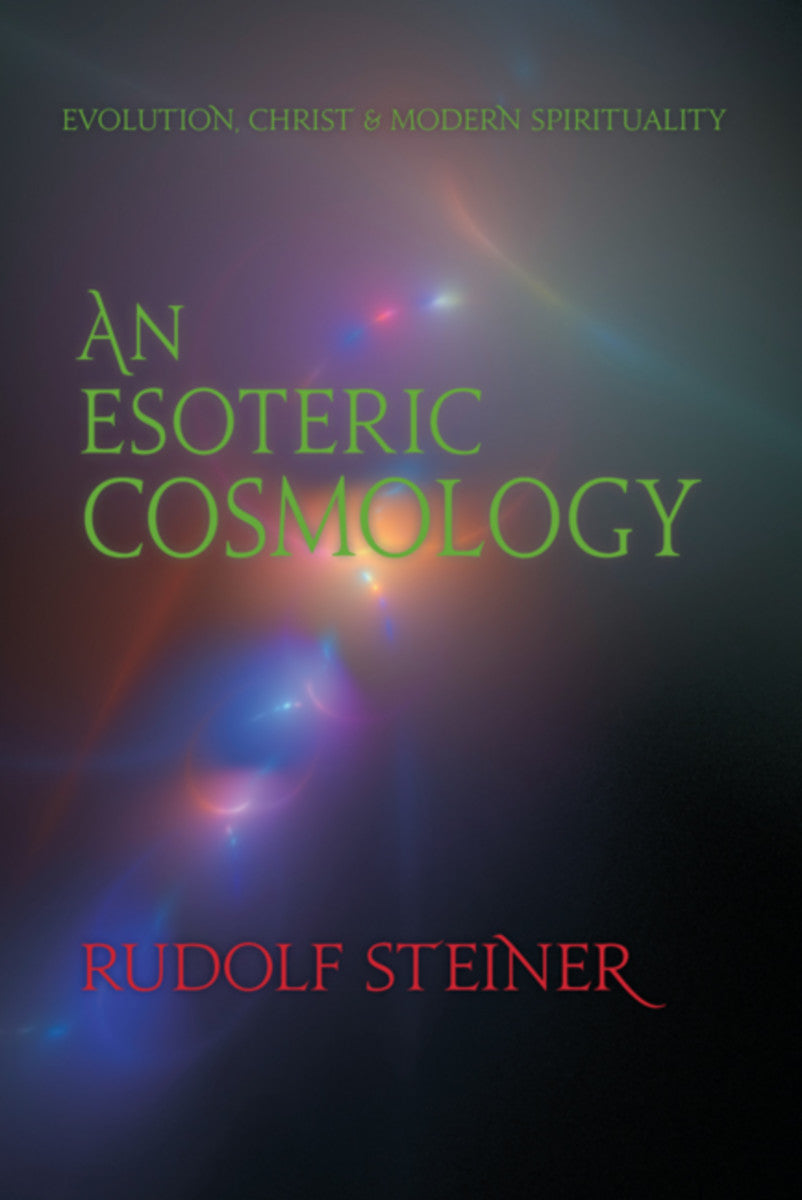Rudolf Steiner Bookshop
An Esoteric Cosmology
An Esoteric Cosmology
Couldn't load pickup availability
An Esoteric Cosmology: Evolution, Christ & Modern Spirituality
Rudolf Steiner (author)
"In the Paris lecture series, I presented the meaning of a spiritual perception that had gradually 'matured' over a long period of time within me. I explained the general relationship among the aspects of the human being - the physical and etheric organizations as the media for manifesting life; the astral body as the medium for manifesting feeling and volition; and the vehicle of the 'I'. Then I added that the ether body of a man is feminine and that a woman's ether body is masculine. Thus, Anthroposophy illuminated a fundamental question of existence that was often discussed at the time..."
"The problem was consequently revealed to be part of the deepest aspects of the human being. The human physical body is introduced very differently into the forces of the cosmos than the human etheric body. In the physical body, human beings exist within Earth's forces; in the etheric body they are linked with the forces of the supra-earthly cosmos. The masculine and feminine aspects lead to the cosmic mysteries. This knowledge was one of my most heart stirring, soul experiences. Again and again, it made me aware of how to approach a spiritual perception with patience, and how, the moment one experiences the maturity of consciousness, one must seize a spiritual perception with concepts so that it may be transmitted into the realm of human knowledge." (Rudolf Steiner, Autobiography)
A congress of the Federation of European Sections of the Theosophical Society was held in Paris in May 1906. Rudolf Steiner attended with a number of students and presented a series of lectures to a small circle of friends, mostly society members. Edouard Schuré was present and made succinct notes of those talks, the result of which is An Esoteric Cosmology: Evolution, Christ, and Modern Spirituality. In is foreword, Schuré describes his initial impressions of Rudolf Steiner and the force of his vision: "These priceless lectures mark a significant phase of Rudolf Steiner's thought - that of the spontaneous burst of his genius and its first crystallization." Indeed, his notes record perhaps the first general outline and summary of what would become Anthroposophy, or spiritual science.
At the time of these lectures, most members viewed Theosophy as a kind of Europeanized Indian philosophy. Thus, one purpose of these lectures was to outline Steiner's Christ-centered spiritual science in contrast to the more Eastern orientation of Theosophy. He carefully connected the essence of spiritual science to the role of the Christ in human evolution, as well as to the Rosicrucian and Christian mystery traditions, the primary carriers of the esoteric Christian stream. To accomplish this, Steiner presented the roots of Christianity in the ancient mysteries and in the evolution of the whole universe itself.
The miracle of these lectures, perhaps, is that Steiner was able to condense such a grand cosmology into these eighteen lectures, and that Edouard Schuré was able to capture their essence in the relatively brief notes that constitute this book. A few years later, the substance of these lectures were expanded and presented in Rudolf Steiner's Outline of Esoteric Science. These lecture notes will prove invaluable for all those who wish to better understand that book, as well as Rudolf Steiner's Christian cosmology and perspective on esoteric Christianity and the Christian mysteries.
Rudolf Steiner (b. Rudolf Joseph Lorenz Steiner, 1861-1925) was born in the small village of Kraljevec, Austro-Hungarian Empire (now in Croatia), where he grew up. As a young man, he lived in Weimar and Berlin, where he became a well-published scientific, literary, and philosophical scholar, known especially for his work with Goethe's scientific writings. At the beginning of the twentieth century, he began to develop his early philosophical principles into an approach to systematic research into psychological and spiritual phenomena. Formally beginning his spiritual teaching career under the auspices of the Theosophical Society, Steiner came to use the term Anthroposophy (and spiritual science) for his philosophy, spiritual research, and findings. The influence of Steiner's multifaceted genius has led to innovative and holistic approaches in medicine, various therapies, philosophy, religious renewal, Waldorf education, education for special needs, threefold economics, biodynamic agriculture, Goethean science, architecture, and the arts of drama, speech, and eurythmy. In 1924, Rudolf Steiner founded the General Anthroposophical Society, which today has branches throughout the world. He died in Dornach, Switzerland.
18 lectures in Paris, May 25 – June 14, 1906 (CW 94)
Publisher : Steiner Books (15 Jan. 2008)
Paperback : 136 pages
ISBN-13 : 9780141046426
Dimensions : 15.24 x 0.81 x 22.86 cm

